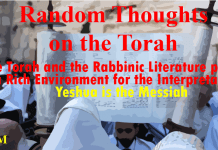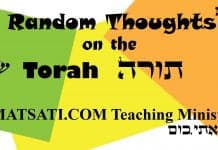The question occasionally comes up “Does Elohim refer to more than one in the Hebrew Bible?” The root of the question comes from sefer Bereshit / Genesis 1:26 which says Then God said, “Let Us make man in Our image, according to Our likeness; and let them rule over the fish of the sea and over the birds of the sky and over the cattle and over all the earth, and over every creeping thing that creeps on the earth.” (NASB) The question relates to who it is that God is referring to when he says “Let Us” make man in “Our image.” The Hebrew Scripture says: וַיֹּאמֶר אֱלֹהִים נַעֲשֶֹה אָדָם בְּצַלְמֵנוּ כִּדְמוּתֵנוּ וְיִרְדּוּ בִדְגַת הַיָּם וּבְעוֹף הַשָּׁמַיִם וּבַבְּהֵמָה וּבְכָל-הָאָרֶץ וּבְכָל-הָרֶמֶשֹ הָרֹמֵשֹ עַל-הָאָרֶץ: The Hebrew text uses the pronominal suffixes “נו” on the words בְּצַלְמֵנוּ כִּדְמוּתֵנוּ meaning “in our image like us.” Christians have typically argued that Elohim is plural for El meaning God and thus proves that God is three the Father, the Son and the Ruach HaKodesh (Holy Spirit). This kind of reasoning is what I call “poor exegetical technique” since an entire doctrine on the trinity is made and summed up based on one word (Elohim). Now, looking at rabbinic commentary from Rabbi Shlomo ben Yitzchak (Rashi) we read:
רש״י בראשית פרק א
כו) נעשה אדם. עִנְוְתָנוּתוֹ של הקב״ה למדנו מכאן, לפי שהאדם הוא בדמות המלאכים ויתקנאו בו, לפיכך נמלך בהן, וכשהוא דן את המלכים הוא נמלך בפמליא שלו, שכן מצינו באחאב, שאמר לו מיכה ראיתי את ה׳ יושב על כסאו וכל צבא השמים עומדים עליו מימינו ומשמאלו, וכי יש ימין ושמאל לפניו, אלא אלו מיימינים לִזְכוּת ואלו משמאילים לחובה, וכן בגזירת עירין פתגמא ת ובמאמר קדישין שְׁאֵלְתָא, אף כאן בפמליא שלו נטל רשות, אמר להם יש בעליונים כדמותי, אם אין כדמותי בתחתונים הרי יש קנאה במעשה בראשית: נעשה אדם. אף על פי שלא סייעוהו ביצירתו, ויש מקום למינים לרדות, לא נמנע הכתוב מללמד דרך ארץ ומדת ענוה, שיהא הגדול נמלך ונוטל רשות מן הקטן, א ואם כתב אעשה אדם, לא למדנו שהיה מדבר עם בית דינו, אלא עם עצמו, ותשובתו ב כתובה בצדו, ויברא את האדם, ולא כתיב ויבראו: בצלמנו. בדפוס ג שלנו: כדמותנו. להבין ד ולהשכיל: וירדו בדגת הים. יש בלשון הזה לשון רידוי ה ולשון ירידה, זכה רודה בחיות ובהמות, לא זכה, נעשה ירוד לפניהם והחיה מושלת בו
Here, I quote all of Rashi’s statements on Bereshit / Genesis 1:26. Rashis states שהאדם הוא בדמות המלאכים saying”that man he is in the form of angels.” Based on the Rabbinic commentary from Rash, God (Elohim) was speaking to the angels and that man was thus created in the form of the angels. Note, Rashi’s justification is based on statements from other sources in the Tanach, the prophet Micah saw the Lord sitting on his throne and all the host of heaven standing on his left and right (שאמר לו מיכה ראיתי את ה׳ יושב על כסאו וכל צבא השמים עומדים עליו מימינו ומשמאלו ). Therefore, Judaism, at least from Rashi’s perspective, claims the angels had a part in this creative process, that it is in their image God made man. So, who is right and how are we to understand why Elohim is written in the plural form?
According to Williams Hebrew Syntax, 3rd Edition, University of Toronto Press, Scholarly Publishing Division, 264 pages, the plural form of the Hebrew word is used to indicate simple plurality such as “king” (מלכים), composition such as “silver” (כספים), “firewood” (עצים), to indicate natural products in an unnatural or manufactured state like “barley” grain (שעורים), to indicate extension when a object consists of separate parts such as “youth” with respect to time (נעורים), and “shed blood” (דמים), to indicate abstract ideas like “faithfulness” (מאמינים), “virginity” (בתולים), “atonement” (כפרים), and finally to indicate respect “God” (אלוהים), Lord “Adonim” (אדונים), and “king” (מלכים). Our understanding on these plural uses of the Hebrew words come from the analysis of the Hebrew sentence, context and syntax that these plural forms produce a singular meaning because the attributive adjectives and verbs that go with the plural form are written in the singular form and not the plural form. In the Hebrew Scriptures, Elohim in its plural form is the plural of respect, plural of majesty, plural of potentiality, or plural of eminence. Elohim therefore refers to “one God” and is used to show the complete majesty and magnificence of God and His holiness. This is how we understand God to be “one God” being spelled in the plural form Elohim. When understanding the trinity or the godhead (the Father, Son, and Ruach) we can not and should not justify our belief based upon one word. We absolutely must understand who God is based on all of scripture and not from the one word (Elohim). So, anyone who uses the one word Elohim to substantiate their case for the trinity are using a very poor exegetical technique (bad exegesis). When we take all of Scripture into consideration, we know that God the Father sits upon the throne in Heaven. The Word of God proceeds from the Father, and the Ruach (Spirit of God) proceeds from the Father. Therefore, the Son (the Word of God), and the Ruach (Spirit) could not exist without the Father, this is how we know God to be one according to Devarim / Deuteronomy 6:4 and remain consistent with scripture on who God is. Yeshua is the Word of God become flesh (John 1:1-14) and the Ruach HaKodesh (Holy Spirit) is the Spirit of God who comes to make His dwelling place in our bodies (1 Corinthians). The main point for this short article is this, we absolutely must take all of scripture into account when trying to understand who God is, what His will is for our lives, and how we are to live our lives for Him. We should not and cannot use one word to base our theological beliefs upon. This is a very dangerous thing and can lead to deception and the development of tradtion and doctrine of men that stands against the truth of God found in the Word of God.








